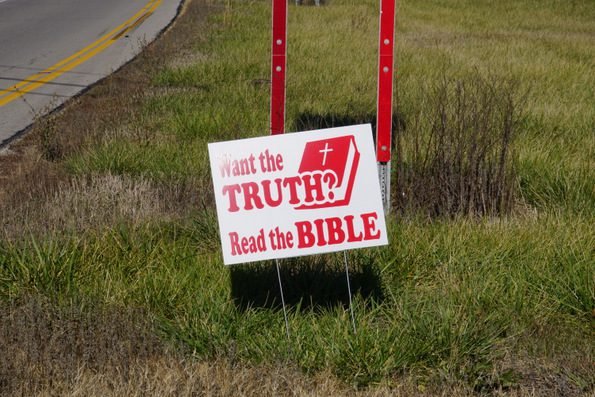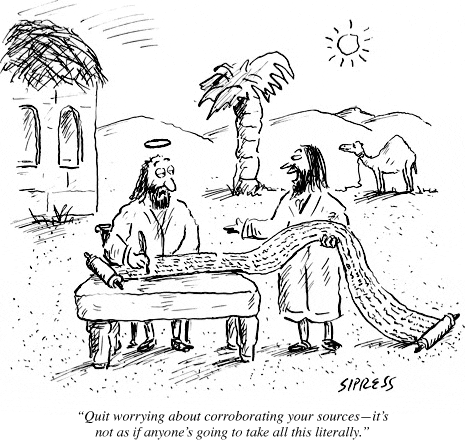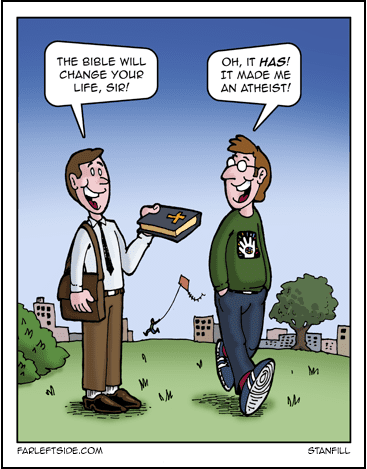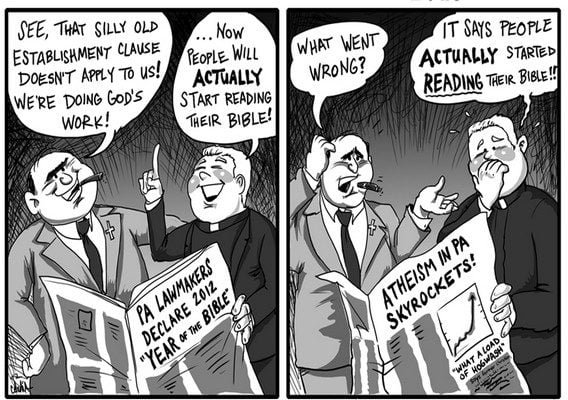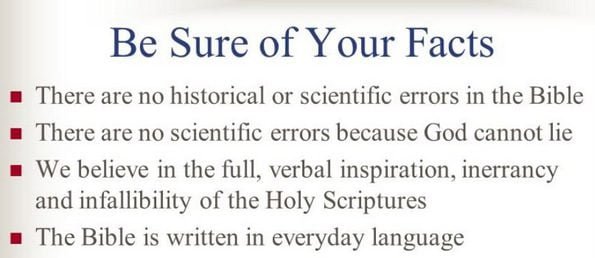
Today, I received the following email from an Evangelical woman named Trese (Teresa) Drek. She totally ignored that I ask people to NOT send me emails like hers. Trese refuses to accept my story at face value. Why? She can’t square my story with her theological beliefs and personal experiences. This is a common problem Evangelicals have with me.
Here’s Trese’s email. All grammar and spelling in the original. My response is indented and italicized.
Hello Bruce,
Im writing to tell you ‘in love’ the truth …
Actually, you are writing to preach at me; to share your personal opinions and personal interpretations of the Protestant Christian Bible.
There’s no “love” in your email, just arrogance and self-righteousness. You can’t or won’t square my story with your peculiar theology, so instead you decide to attack me and trash my character. Instead of trying to honestly engage me, you chose to discredit me and call me a liar.
You had 50 yrs of “experience” as a fake christian who had a false conversion. You were never born again! Thus , you never had a deconversion. (“I know it must painful for you to read about my deconversion.”) That is my message to you in a nutshell.
What evidence, Trese, do you have for these claims? Outside of your own experiences and beliefs, that is? Think about all the people who heard me preach over the years. Think about all my Evangelical friends and colleagues in the ministry. Think about my Evangelical family members who are pastors, evangelists, and missionaries. All of these people observed my life up close, yet none of them ever said, “Bruce, you are not a real Christian.” Not one. In every way, my life said to everyone that I was a devout follower of Jesus (and by all means, you are free to seek out these people on the Internet and social media and ask them). Thus, I was either a master deceiver, or you, Trese. are full of shit. I’m going with the latter, as will the people who know me.
Why didnt the following verses ring true to you when ‘you decided’ you were ‘no longer a christian’?
The Father gives the heart of repentance and the measure of faith. Triune God is the author and finisher of ones faith. You never received real Godly repentance or real faith because those that do never leave!
“If I wanted to be a True Christian, I had to come forward to the front of the church, kneel at the altar, and pray a certain prayer. If I did these things, I would then be a Christian — forever. And so I did. ” ( this is the ‘Billy Graham way’ who was never a real christian either. )
Welp, there’s no God, so of course, I didn’t actually receive these things from him/her/it. Much like all Christians, including you, I was a product of indoctrination, conditioning, cultural experiences, and environmental factors.
I find it interesting that you cherry-picked one experience from my story to build this false narrative about me in your mind. Why not take my story as a whole? The answer, of course, is that doing so would destroy the caricature you built of me in your head.
Billy Graham was never a Christian? Really? I mean really?
1 John 2:19
“They went out from us, but they were not of us; for if they had been of us, they would no doubt have continued with us: but they went out, that they might be made manifest that they were not all of us.”
Acts 11:18
When they heard this, they quieted down and glorified God, saying, “Well then, God has granted to the Gentiles also the repentance that leads to life.”
2 Timothy 2:25
with gentleness correcting those who are in opposition, if perhaps God may grant them repentance leading to the knowledge of the truth,
Romans 12:3
For by the grace given to me I say to everyone among you not to think of himself more highly than he ought to think, but to think with sober judgment, each according to the measure of faith that God has assigned.
John 6:39
And this is the will of Him who sent Me, that I shall lose none of those He has given Me, but raise them up at the last day.
John 6:65
Then Jesus said, “This is why I told you that no one can come to Me unless the Father has granted it to him.”
John 10:28
I give them eternal life, and they will never perish. No one can snatch them out of My hand.
Golly gee, I have never, ever read or studied these verses. *sigh* By the way, I have preached sermons from all of these verses. I preached a 100+ sermon series from the book of John.
Quoting Bible verses to me has no magical powers. The Bible is just words on pages, ink on paper. Do you have any evidence that suggests otherwise?
Isnt it amazing that a professed well read man can miss so many scriptures (or purposefully forget) that explain you and your newfound friends walking away?
Yes, I am well-read. Are you? As I mentioned above, I know these Scriptures quite well. Perhaps the real issue here is whether the Bible is what you claim it is: God’s inspired, inerrant, infallible Word. I would love to engage you on this subject. If I can disabuse of the notion that that Bible is inerrant or infallible, perhaps you can then see that your peculiar interpretations of the Bible don’t hold water.
Have you ever read any of Dr. Bart Ehrman’s books? Ehrman is a New Testament scholar and historian at the University of North Carolina. I am confident that if you will read several of his books you will see that the Bible is not what you claim it is. Are you up to my challenge? I will even buy one his books and have it shipped to you. Won’t cost you a dime.
“Everywhere I look, I see agnostics and atheists who were once devoted followers of Jesus Christ. Pastors, youth directors, worship leaders, missionaries, deacons, evangelists, soulwinners, bus workers, and Sunday school teachers; on-fire, filled-with-the-Holy-Ghost Christians. Thousands of former followers of the King of Kings and Lord of Lords read this blog. Were all of these washed-in-the-blood Christians deceived, never having tasted the goodness of God? Would a scientist doing a study on this group conclude that they were false Christians? Of course not. In every way, they were once numbered among those who followed the lamb wherever he went. When Jesus said “follow me,” they cast their nets aside, forsook all, and followed him. No matter what they now are, the past cannot be erased by the wave of a magic theological wand.”
You quote me, yet don’t interact with what I wrote. Why is that? What I wrote above is a statement of fact based on thirteen years of interaction with countless former devout Christians; men and women who were pastors, youth directors, worship leaders, missionaries, deacons, evangelists, soulwinners, bus workers, and Sunday school teachers.
You expect me and the readers of this blog to accept your testimony of Christian faith at face value — and we do. If someone says “I am a Christian,” I believe them. Why can you not extend the same courtesy to former Christians? Why do you refuse to respect the life stories of others, dismissing them out of hand, all because of your theological beliefs?
Oh and by the way; “evangelical christianity” is for the most part ‘main stream apostate christianity’ today thus it is not the term fruit bearing discerning christians use for themselves ; myself included.
*sigh* If it walks, talks, and acts like an Evangelical . . .
You have been infected by the A.W. Pink virus. Pink was a 20th century Evangelical Calvinist. In his early years, Pink was a pastor and an evangelist. Over time, Pink become more and more disaffected by what he saw in Evangelical churches. Instead of taking a hard look at himself, Pink blamed others for his disaffection. Pink eventually stopped going to church, believing that no congregation was pure enough for him. He spent the remaining years of his life writing books and raging against Christians who believed differently from him.
There’s a cure for the A.W. Pink virus: self reflection and a willingness to accept people as they are, even those who believe differently from you.
“Ask yourself, “how will my email reflect on Jesus, Christianity, and my church?””
My email glorifies my Lord Jesus Christ , true christianity that adheres the Gods word, and my entire church family who are those who are in Christ! It does so because my words to you are Christ’ truth written !
*sigh* I want to say that you are delusional, but then I remember that I once believed as you do. Yes, Trese, a never-saved preacher believed just like you. Ponder that for a moment.
“Always silent, Jesus. Why is that?”
Jesus speaks to mankind through his holy living scriptures . We speak to Jesus through our prayers. Why would a guy who “pastored” a church for 25 yrs expect Jesus to speak to him except through the holy scriptures?
Your comment reveals that you really don’t know your Bible very well. The Bible says that God speaks to us through creation, divine revelation (the Bible), the preaching of the Word, prayer, the sacraments, and personal interaction — the still small voice of God in our hearts. The Bible is replete with stories of God speaking directly to people. You do know that most Christians didn’t have a printed copy of the Bible for 1,500 years after the death of Christ. How did God speak to these Christians without the Bible?
You may print my email to you if you wish to! I used my real name and real email address. I am confident that if it is Gods will ; some of your readers will be drawn to the Father through scriptures provided. Scripture has a way into a mans soul like no other words written ever IF GOD IS DRAWING HIM! Perhaps , the Father will draw you to!
I assume you are a Calvinist. Most of the readers of this blog have read the Bible many, many times. Some of them were in the ministry for years. They are not ignorant of what the Bible says.
Let’s see if your magic book leads to the salvation of one person. If one regular reader, after reading your email, repents of their sins, and professes faith in Christ, I will stop blogging. There ya go, God and Trese, bring down your saving power on the deluded readers of this blog. Save them, Lord! In Jesus’s name, deliver them from darkness! We are waiting . . .
And when this doesn’t happen, Trese, are you willing to admit that you and your God are failures? Are you willing to admit that you and God are no match for skepticism, reason, and intellectual inquiry?
I deleted the remainder of Trese’s Bible quotations. I suppose I just damned some of you to hellfire and brimstone by not publishing the rest of the soul-saving verses. You were three verses away from eternal life. I’m sorry. I will see you in Hell.
Saved by Reason,

Bruce Gerencser, 68, lives in rural Northwest Ohio with his wife of 47 years. He and his wife have six grown children and sixteen grandchildren. Bruce pastored Evangelical churches for twenty-five years in Ohio, Texas, and Michigan. Bruce left the ministry in 2005, and in 2008 he left Christianity. Bruce is now a humanist and an atheist.
Your comments are welcome and appreciated. All first-time comments are moderated. Please read the commenting rules before commenting.
You can email Bruce via the Contact Form.


